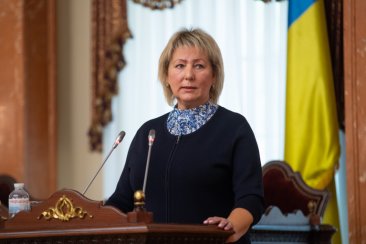Contact center of the Ukrainian Judiciary 044 207-35-46

The Plenum of the Supreme Court submitted to the Constitutional Court of Ukraine a request on the constitutionality of certain provisions of Law No. 1635-IX
Today, October 8, 2021, the Supreme Court continued its session of the Plenum, which had been adjourned on September 17, 2021. The Plenum of the Supreme Court has considered a request of the High Council of Justice concerning a submission to the Constitutional Court of Ukraine on the constitutionality of certain provisions of the Law of Ukraine, of 14 July, 2021, No. 1635-ІХ "On Amending Certain Legislative Acts of Ukraine Regarding the Procedure for the Election (Appointment) of Members of the High Council of Justice and the Activities of Disciplinary Inspectors of the High Council of Justice".
Reporting on this issue, the President of the Supreme Court Valentyna Danishevska noted that during the break in the plenary session there was held a series of meetings in the Office of the President of Ukraine with the participation of the judiciary and ambassadors of the G7 and the EU during which the parties tried to "reduce mistrust towards each other" and build further steps so that the goal of judicial reform was achieved without devastating consequences for the judiciary.
According to the SC President, a significant achievement in these negotiations was that the representatives of public authorities to some extent accepted the warnings and concerns of the judiciary, and representatives of the international community assured that the most professional experts, who will not violate the Constitution of Ukraine by their actions, would be delegated to the Ethics Council.
"The Plenum of the Supreme Court should apply to the CCU with this submission in order to protect judicial reform from violations of the Constitution of Ukraine, so that its results are sustainable and not destroyed in the future," said Valentyna Danishevska.
She noted that judicial reform was not a one-step process and at each of those steps it could be undermined if a certain step did not comply with the Basic Law. The task of the Plenum of the Supreme Court is to take the step necessary for those who will be implementing judicial reform. So that every action of the Ethics Council is not appealed to the court in the future, so that the Supreme Court does not become responsible for revoking the decisions adopted by the Ethics Council.
The President of the Supreme Court pointed out that the project prepared for consideration at the Plenum was much narrower than the HCJ's appeal and contained four main issues. It is also important that the Constitutional Court of Ukraine has already expressed its position on the first three issues.
Firstly, the state of legislative regulation, which allows the termination of the powers of several members of the HCJ, poses real significant threats to the principle of continuous functioning of the HCJ as a body endowed with key, constitutional, fundamental powers in the judiciary. The powers of the HCJ cannot be delegated to other authorities, and the Constitution of Ukraine does not provide for alternative ways of resolving issues within the competence of the HCJ.
Secondly, the adoption of the law, which provides for the re-evaluation of judges who are members of the HCJ, is indicative of another interference by Parliament in the independence of the judiciary as a whole, which is unacceptable for the proper state of justice and the constitutional order, since only an independent court is an integral part of the existence of a state governed by the rule of law.
Thirdly, the powers to dismiss HCJ members are vested in the bodies that elect (appoint) members of the High Council of Justice, and the Parliament is only one of them, so dismissal of important public officials through the adoption of regulations is unacceptable.
Fourthly, the procedure for decision-making by the Ethics Council (when the will of representatives of international organizations prevails over the will of members of the Ethics Council from among judges or retired judges appointed by the Council of Judges of Ukraine) eliminates the statutory procedure for the formation of the relevant body provided for by law, which in turn violates the principle of independence of judges, regulated by Art. 126 of the Constitution of Ukraine.
"The appeal of the Plenum will not undermine judicial reform, but will only strengthen it, prevent its destruction," the President of the Supreme Court noted, putting to the vote a proposal to send the appeal to the CCU. This proposal was supported by a majority of Supreme Court judges.
After hearing and discussing the report of Valentyna Danishevska, the Plenum of the Supreme Court appealed to the Constitutional Court of Ukraine to verify the constitutionality of the provisions of paragraph thirteen of part 23-1 of Section III "Final and Transitional Provisions" of the Law of Ukraine of December 21, 2016, No. 1798-VIII "On the High Council of Justice", paragraphs one (in terms of re-evaluation of members of the High Council of Justice who are judges), six and eleven of part 4 of Section II "Final and Transitional Provisions" of the Law of Ukraine of July 14, 2021, No. 1635-IX "On Amending Certain Legislative Acts of Ukraine Regarding the Procedure for the Election (Appointment) of Members of the High Council of Justice and the Activities of Disciplinary Inspectors of the High Council of Justice".
The next session of the Plenum of the Supreme Court is scheduled for October 22, 2021. The meeting will look at the election of a new President of the Supreme Court, as the powers of the current President of the Supreme Court expire in November 2021.